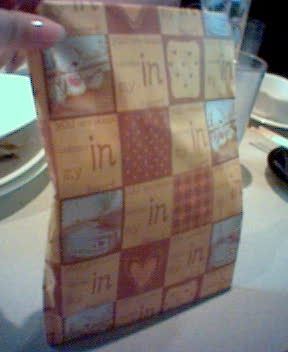Thursday, December 22, 2005
Freezing
Everytime in office is f**king Freezing loh... Haiz... So boring nothing to do... Alone at the counter... My dear Tina is on leave... So lonely... Listening to Christmas carol alone... Check out this link... http://www.syfc.org.sg/christmas05/hokkien.htm
Tuesday, December 20, 2005
Lunch
That crazy Callie, my second sister, came to look for me for lunch... So crazy loh... All of a sudden so nice... Weird... From her home Pasir Ris drove all the way to my work place just to have lunch with me... So weird... We had lunch at MS... MS changed so much loh... Too long never go MS liao... The WEIRD thing is she treat me for lunch... Super Weird... Must be something wrong about her...
Saturday, December 17, 2005
Celebration Christmas Cum Belated Birthday
Working in the morning then after work rush to Suntec to meet them. They are Caren, Gary, Wenqi & Nik. Plus no time to buy present so went to guardian to buy. Worried Caren would get my present so i didn't bought Chocolate. Bought a voice recorder and a mud face mask. Guess who got my present... Nik... Ha ha... Really very suitable for him leh... Voice recorder... Caren & Wenqi would know wats the joke about... haha... We ate at Kuishinbo... And then we exchange our gifts... After lunch i went to meet Jeanne... We went to the Victoral Secret warehouse sales... In the end not looking at VS things but Nike things... Haha... Bought some items... Then we went home... nothing much to see but somehow or rather we manage to spend 1hr 20mins inside... haha...
Look at Wat kind of wrapper Nik Used...
Back

Front

This is then called wrapping loh...

Do you know how to wrap, Nik???

Obscene Act By Nik One

Obscence Act by Nik Two

Birthday Present From Caren, Nik, Gary & Wenqi.

Look at Wat kind of wrapper Nik Used...
Back

Front

This is then called wrapping loh...

Do you know how to wrap, Nik???

Obscene Act By Nik One

Obscence Act by Nik Two

Birthday Present From Caren, Nik, Gary & Wenqi.

Tuesday, December 13, 2005
Ouch
When to tui my leg and hand again today... Took half day leave to see the doctor... Haiz... I getting old liao... All the symtoms come out liao... Don't know when will die... Haiz...
Saturday, December 10, 2005
Painting
Orange... Vanilla colour with vanilla smell... Paint paint paint... With my leg aching throughout... Haiz... Use hand to paint... But leg pain... Like no logic hor... Work eat work then eat work then eat work again... non-stop... Like worker like that... About 4 coatings... Thats alot of work... Plus Wenqi went off earlier leaving me & Nik... orh... still got Caren... got her and no her think no difference lah... I will forgive you Caren...
Tuesday, December 06, 2005
Think Faster, Remember More
10 mysteries of the mind revealed
1. How a memory is made
Let's say you meet someone new. The first time you see her, you take it all in: the length of her hair, the sound of her voice, that fresh shampoo scent that follows her around. As you're fumbling for an opening line, your hippocampus, a sea-horse-shaped area in your brain's temporal lobe, has already converted all these external stimuli into a memory. All potential memories must go through this mental gatekeeper before they take root in your mind. But the hippocampus is just a holding area, the first step in a complex process. After a memory has been forged, it's disassembled into its various sensory components, which are then distributed throughout the brain. Later, when you think of the person or happen to hear her name, see her face, or smell her hair, the components are drawn together again.
2. How alcohol affects your memory
Before it hits you over the head with a hangover, too much booze produces temporary amnesia by interfering with the ability of the hippocampus to create memories. (This is also known as a "blackout.") The memories that aren't lost can be especially tough to recall—unless you start drinking again and your brain taps into something called "state-dependent" memory. "When you encode memories while in a specific state, like being drunk, you're more likely to remember them when you're again in that state," says Jonathan Schooler, Ph.D., an assistant professor of psychology at the University of British Columbia. This may explain why Old School quotes start flying faster right around last call.
3. Why you can't remember being born
You might think something as traumatic as birth would leave its mark on your memory, but chances are you can only recall back to age 5. Why? One theory points to myelin, the protective nerve sheathing that helps with signal conduction; before age 5, a child's brain is low in myelin. "It may be important in long-term memory maintenance," says Schooler. Another possible explanation: As we learn to speak, we can no longer access memories created in our preverbal years. "With the onset of language, the way we think may change, making it impossible to get into the shoes of our older memories," Schooler says.
4. How memory stacks up to an iMac
It's a close race, but humans have the edge—for now. Our brains have about a thousand times the memory capacity of even the most sophisticated computer (though that could change by the year 2020). What's more, gray matter is a much more reliable storage device. Unlike computers, which store entire pieces of information in specific locations, the human brain spreads memories over many neurons. "This means that losing a single neuron doesn't have to affect memory performance," says David Leake, Ph.D., a professor of computer science at the University of Indiana.
5. How testosterone can help you remember
T may be essential for building memories as well as muscles. In a study at Oregon Health & Science University, men taking a drug designed to halt T production did significantly worse on verbal-memory tasks than men who weren't given the medication. "Animal studies have shown that if testosterone is taken away entirely, there's significant loss of the connections between neurons," says Jeri Janowsky, Ph.D., a professor of behavioral neuroscience and coauthor of the study.
6. What amnesia is all about
Forget what you've seen on soap operas. "Retrograde amnesia, the total blackout of memory so beloved on television, is relatively rare," says Alan Baddeley, Ph.D., author of Your Memory: A User's Guide. When retrograde amnesia does occur, it's often due to severe psychological trauma rather than a nasty bonk on the head. A head injury would more likely cause anterograde amnesia, the condition featured in the movie Memento. "You can talk to someone with this condition and he'll be able to tell you his name, keep up with the conversation," says Michael Stadler, Ph.D., a professor of psychology at the University of Missouri. "But if you leave the room and come back 10 minutes later, he won't remember you."
7. Why you never forget how to ride a bike
When a child learns to ride a bicycle, he makes two sets of memories: One is explicit memory, which records things like the color of the bike and the elation of riding unassisted. Implicit memory, on the other hand, notes the body mechanics required to ride the bike, which is why it's sometimes called "muscle memory," says Janet Gibson, Ph.D., a professor of psychology at Grinnell College, in Iowa. Even when explicit memories fail, implicit ones remain.
8. Why hypnotism works—sometimes
Just because you can't remember an event, name, or face doesn't mean it's not still lurking in your brain, able to be retrieved through hypnotism. That's because our brains appear to have a threshold of what's considered fully formed memory, and hypnosis lowers that threshold (though how it does this is still unknown). Fragments and half-processed memories that your brain's retrieval system may not recognize when you're in a conscious state can be recognized under hypnosis as legitimate experiences. "It gets rid of your internal monitoring," says Schooler. However, with your threshold temporarily lowered, your mental guard is down: You're prone to suggestion—e.g., "cluck like a chicken"—and more likely to remember statements from the hypnotist as your own memories.
9. Why you lose your keys
It's impossible (and impractical) to remember each detail of our daily lives, so our brains compensate by making memory generalizations called schemata. For example, instead of remembering every apple you've ever eaten, your brain creates a schema of apples: hard, red, sweet. Same thing happens with your keys. Rather than recall every instance of placing your keys on, say, the dresser, you create a "keys = dresser" schema, so you have difficulty remembering the rare instances that don't fit the formula.
10. How to preserve your memory
"Statistically, the most common form of memory loss occurs through natural aging," says Baddeley. "You become worse at encoding and retrieving new information, particularly arbitrary information, such as people's names." One way to battle this brain drain is by recruiting help from your sense of sight. "Your visual sense takes up roughly 60 percent of your brain area," says Frank Felberbaum, a memory-training expert and the author of The Business of Memory. So if you want to remember someone's name, turn it into a visual image and link it to a prominent part of the person's appearance. In Felberbaum's case, he says, picture falling (fel) beer (ber) bombs (baum) hitting him on the nose. The key is to pick a facial feature that's both distinctive and unlikely to change over time; results may vary with Hollywood starlets and members of the Jackson family.
1. How a memory is made
Let's say you meet someone new. The first time you see her, you take it all in: the length of her hair, the sound of her voice, that fresh shampoo scent that follows her around. As you're fumbling for an opening line, your hippocampus, a sea-horse-shaped area in your brain's temporal lobe, has already converted all these external stimuli into a memory. All potential memories must go through this mental gatekeeper before they take root in your mind. But the hippocampus is just a holding area, the first step in a complex process. After a memory has been forged, it's disassembled into its various sensory components, which are then distributed throughout the brain. Later, when you think of the person or happen to hear her name, see her face, or smell her hair, the components are drawn together again.
2. How alcohol affects your memory
Before it hits you over the head with a hangover, too much booze produces temporary amnesia by interfering with the ability of the hippocampus to create memories. (This is also known as a "blackout.") The memories that aren't lost can be especially tough to recall—unless you start drinking again and your brain taps into something called "state-dependent" memory. "When you encode memories while in a specific state, like being drunk, you're more likely to remember them when you're again in that state," says Jonathan Schooler, Ph.D., an assistant professor of psychology at the University of British Columbia. This may explain why Old School quotes start flying faster right around last call.
3. Why you can't remember being born
You might think something as traumatic as birth would leave its mark on your memory, but chances are you can only recall back to age 5. Why? One theory points to myelin, the protective nerve sheathing that helps with signal conduction; before age 5, a child's brain is low in myelin. "It may be important in long-term memory maintenance," says Schooler. Another possible explanation: As we learn to speak, we can no longer access memories created in our preverbal years. "With the onset of language, the way we think may change, making it impossible to get into the shoes of our older memories," Schooler says.
4. How memory stacks up to an iMac
It's a close race, but humans have the edge—for now. Our brains have about a thousand times the memory capacity of even the most sophisticated computer (though that could change by the year 2020). What's more, gray matter is a much more reliable storage device. Unlike computers, which store entire pieces of information in specific locations, the human brain spreads memories over many neurons. "This means that losing a single neuron doesn't have to affect memory performance," says David Leake, Ph.D., a professor of computer science at the University of Indiana.
5. How testosterone can help you remember
T may be essential for building memories as well as muscles. In a study at Oregon Health & Science University, men taking a drug designed to halt T production did significantly worse on verbal-memory tasks than men who weren't given the medication. "Animal studies have shown that if testosterone is taken away entirely, there's significant loss of the connections between neurons," says Jeri Janowsky, Ph.D., a professor of behavioral neuroscience and coauthor of the study.
6. What amnesia is all about
Forget what you've seen on soap operas. "Retrograde amnesia, the total blackout of memory so beloved on television, is relatively rare," says Alan Baddeley, Ph.D., author of Your Memory: A User's Guide. When retrograde amnesia does occur, it's often due to severe psychological trauma rather than a nasty bonk on the head. A head injury would more likely cause anterograde amnesia, the condition featured in the movie Memento. "You can talk to someone with this condition and he'll be able to tell you his name, keep up with the conversation," says Michael Stadler, Ph.D., a professor of psychology at the University of Missouri. "But if you leave the room and come back 10 minutes later, he won't remember you."
7. Why you never forget how to ride a bike
When a child learns to ride a bicycle, he makes two sets of memories: One is explicit memory, which records things like the color of the bike and the elation of riding unassisted. Implicit memory, on the other hand, notes the body mechanics required to ride the bike, which is why it's sometimes called "muscle memory," says Janet Gibson, Ph.D., a professor of psychology at Grinnell College, in Iowa. Even when explicit memories fail, implicit ones remain.
8. Why hypnotism works—sometimes
Just because you can't remember an event, name, or face doesn't mean it's not still lurking in your brain, able to be retrieved through hypnotism. That's because our brains appear to have a threshold of what's considered fully formed memory, and hypnosis lowers that threshold (though how it does this is still unknown). Fragments and half-processed memories that your brain's retrieval system may not recognize when you're in a conscious state can be recognized under hypnosis as legitimate experiences. "It gets rid of your internal monitoring," says Schooler. However, with your threshold temporarily lowered, your mental guard is down: You're prone to suggestion—e.g., "cluck like a chicken"—and more likely to remember statements from the hypnotist as your own memories.
9. Why you lose your keys
It's impossible (and impractical) to remember each detail of our daily lives, so our brains compensate by making memory generalizations called schemata. For example, instead of remembering every apple you've ever eaten, your brain creates a schema of apples: hard, red, sweet. Same thing happens with your keys. Rather than recall every instance of placing your keys on, say, the dresser, you create a "keys = dresser" schema, so you have difficulty remembering the rare instances that don't fit the formula.
10. How to preserve your memory
"Statistically, the most common form of memory loss occurs through natural aging," says Baddeley. "You become worse at encoding and retrieving new information, particularly arbitrary information, such as people's names." One way to battle this brain drain is by recruiting help from your sense of sight. "Your visual sense takes up roughly 60 percent of your brain area," says Frank Felberbaum, a memory-training expert and the author of The Business of Memory. So if you want to remember someone's name, turn it into a visual image and link it to a prominent part of the person's appearance. In Felberbaum's case, he says, picture falling (fel) beer (ber) bombs (baum) hitting him on the nose. The key is to pick a facial feature that's both distinctive and unlikely to change over time; results may vary with Hollywood starlets and members of the Jackson family.
Monday, December 05, 2005
I'm Back
Miss me rite... Haha... When to genting then KL... Stay in Times Square at KL... A five star hotel... Guess what i booked Studio Suite but they upgrade me to Superior Suite for free... But... The room service there is very poor... Call for an extra bed, have to call 5 times before they send it to us... Then called regarding the tv remote control no battery, and requested for new placement of batteries guess wat... My first call was at 3pm... My 7th call at 12am midnight liao... My battery still not changed... Then guess what... The toilet... OMG man... Don't know how to discribe loh... The tiles can kill... Look at the pictures man...
Big Room

Tv and radio(the one at the centre isn't working)

Toilet(the one on the right is meant for washing your butt after you...)

Bath Tub

Shower (normal)

Shower (killing)

Take A Closer Look(if these marble tiles ever give way as i am bathing... My legs would be gone...)

Big Room

Tv and radio(the one at the centre isn't working)

Toilet(the one on the right is meant for washing your butt after you...)

Bath Tub

Shower (normal)

Shower (killing)

Take A Closer Look(if these marble tiles ever give way as i am bathing... My legs would be gone...)

Subscribe to:
Comments (Atom)